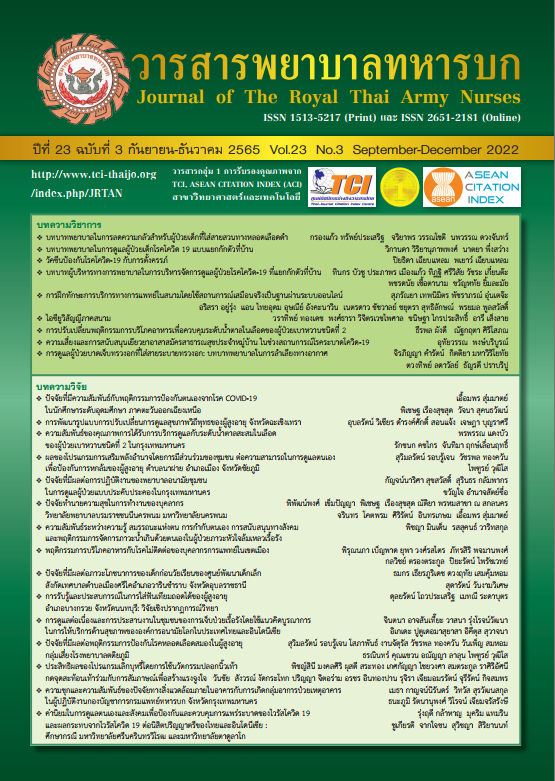Food Consumption Behaviors and Non-Communicable Diseases among Urbanized Medical Personnel
Keywords:
Food consumption behavior (FCB), Urban, Communicable DiseasesAbstract
This study aimed to compare the differences in food consumption behavior (FCB) with noncommunicable diseases from a sample of 412 medical staff who work in an urbanized area (353 person) and those in non-urbanized (59 person). The populations were selected by stratified sampling method. The FCB questionnaire, previously used in the study by family members of the officers of Phramongkutklao Hospital, was applied for our study. The questionnaire had good reliability in our study, with Cronbach’s Alpha coefficient at 0.86. Statistical analyses in our study including frequency, percentage, mean and standard were used for the descriptive data; independent t-tests and Fisher exact tests were used for the analytical part. The FCB was divided into 3 levels: good, moderate, and should be improved.
The results of our study demonstrated that FCB was associated with a risk of several chronic diseases such as hypertension, chronic kidney disease, cancer, diabetes, and obesity among staff in the Faculty of Medicine Vajira Hospital (urbanized area) and Somdet Phra Sangharaja-19 Hospital (non-urbanized area). Comparing the percentage of each aspect by considering the frequency of practice, it was found that the staff of the two centers did not differ significantly with statistical significance (P<0.05). There was no significantly different in the overall behavior of the staff between centers. The overall score in the Faculty of Medicine Vajira Hospital (urbanized area) and Somdet Phra Sangharaja-19 Hospital (non-urbanized area) were x = 3.11, SD=0.88vs. x=3.18, SD=0.95, respectively, However, in terms of However, in terms of eating grilled food, including meatballs, pork, chicken, and fish was significantly different between centers, with all (P<.05).
In summary, FCB according to consumerism among medical staff from urban and non-urban are still had a risk for chronic diseases. Therefore, the consumption behaviors should be research studies other for plan to promote or encourage personnel to have good consumption behaviors to prevent non-communicable diseases and enhance good health.
Downloads
References
Piaseu N. Nutritional care for the control of chronic non-communicable disease groups in the community. 1st. Bangkok: Jud thong Company; 2018. (in Thai).
Suebsamarn S, Supthanasub A, editors. Food Service Management in Institutions. 4ed. Nonthaburi: Sukhothai Thammathirat University; 2016. (in Thai).
Poonperm R. Food Consumption Behaviors of Family in the Community of Phramongkutklao Hospital personnel’s Residence. Journal of The Royal Thai Army Nurses. 2016; 17(2) : 78-88. (in Thai)
Vasuthada C, Jaikla N, Jarujit S, Dechavoot L. The Relationship between Perception toward Non-communicable Diseases and Health Promotion Behaviors for Non-communicable Diseases Prevention among People in Muang District, Chanthaburi Province. Journal of Phrapokklao Nursing College. 2018; 29(2) : 47-59. (in Thai)
Rotjanachewakom S. The Attitudes and Behaviors on Food Consumptions of the Staff inthe Sakon Nakhon Hospita. Nursing, Health, and Education Journa. 2019; 2(3) : 32-42. (in Thai)
Chen D, Rivera AA, Gonzalez J, Burt D, Mendoza MC, Patrie J, et al. Prevalence of risk factors for noncommunicable disease in an indigenous community in Santarigo Atilan Guatemala. Rev Panam Salud Pubica. 2017; 4(7) : 1-9.
Chaitokkia S. Factors affecting food consumption behaviors of adults in northeastern Thailand. Research and Development Journal, Loei Rajabhat University. 2018; 13(45) : 68-78. (in Thai)
Sridawruang C, Worawong C, Sriyasak A, Howharn C, Manassatchakun P. Relationships between Knowledge, Attitude, and Behavior toward Food Consumption and Physical Exercises among Rural Overweight Middle-Aged Adults. Regional Health Promotion Center 9 Journal. 2020; 35 : 464-82. (in Thai)
Boonyasopun U, Aree P, Srisuphan W, Wongsurapraki S. Perception of Benefits and Barriers, Perceived Self-efficacy, Social Support and Eating BehaviorToward Nutritive Value and Safety among Women Living in the Inner City and Outside City Area Christian University Journal. 2019; 25(1) : 1-18. (in Thai)
Chalermdan N. Consumers’ Behavior on Buying Delivery Food Via Mobile Application During New Species of Corona Virus 2019 (COVID-19) in Bangkok. Journal of Industrial Business Administration. 2020; 2(1) : 92-106. (in Thai)
Chenarides L, Grebitus C, Lusk LJ., Printezis R. Food consumption behavior during the COVID-19 pandemic. Wiley Agribusiness an International Journal. 2020; 1-38.
Srisomthrong K, Petsirasan R, Noonil N. Food Consumption Behaviors and Nutritional Status among Adults and Older Persons in Nakhon Si Thammarat. Rama Nurs J. 2021; 27(2) : 232-46. (in Thai)
Tobunma S, Kunalai N. Behavior of Using Food Delivery. Thesis B.Econ. in Economics, Naresuan University; 2019. (in Thai)
Downloads
Published
How to Cite
Issue
Section
License
Copyright (c) 2022 Journal of The Royal Thai Army Nurses

This work is licensed under a Creative Commons Attribution-NonCommercial-NoDerivatives 4.0 International License.
บทความหรือข้อคิดเห็นใดใดที่ปรากฏในวารสารพยาบาลทหารบกเป็นวรรณกรรมของผู้เขียน ซึ่งบรรณาธิการหรือสมาคมพยาบาลทหารบก ไม่จำเป็นต้องเห็นด้วย
บทความที่ได้รับการตีพิมพ์เป็นลิขสิทธิ์ของวารสารพยาบาลทหารบก
The ideas and opinions expressed in the Journal of The Royal Thai Army Nurses are those of the authors and not necessarily those
of the editor or Royal Thai Army Nurses Association.






